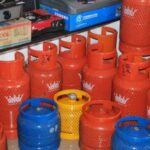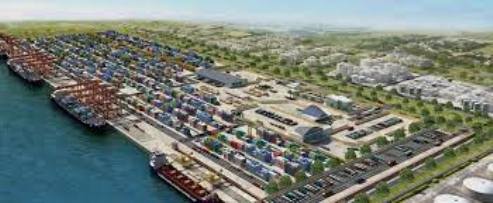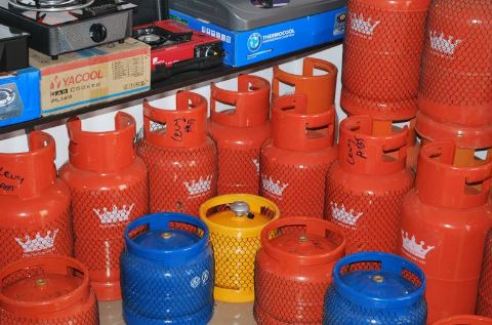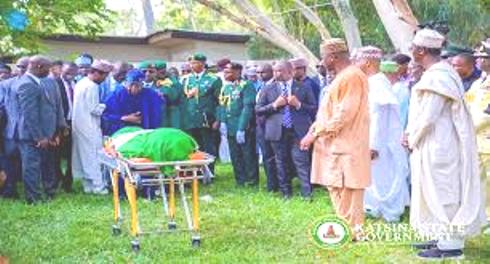LAGOS APRIL 4TH (NEWSRANGERS)-Nigeria’s six legacy ports, Apapa; Tin Can Island; Calabar; Warri; Port Harcourt and Onne Ports are facing existential threat from the newly operational Lekki Deep Sea port, Business Hallmark can report.
The six ports, findings revealed, have continued to lose experienced hands, as well as high value customers to the more modern and efficient competitor, and are now left with no other option than to restrategise or risk becoming redundant like the defunct NITEL, PHCN, Nigerian Airways and many other Federal Government owned legacy firms.
According to its visioners, Lekki Deep Sea Port was conceptualized in 2008 during the administration of former Governor Babatunde Fashola to meet significant gap in containers demand which is put at 0.8 million TEUs in 2016 and 1.8 million in 2022. Demand is expected to reach 5.5 million TEUs in 2025.
Meanwhile, capacity at the nation’s six major ports combined, which is put at just 2.2 million TEUs and said to be growing at a relatively slower rate, has led to the ports been clogged up and goods meant to be cleared in 48 hours reaching up to a week, and in some instances, three to four weeks to get cleared.
BH recalled that the contractor handling port construction, China Habour Engineering LFTZ Enterprise (CHELE), had on Monday, October 31st, 2022, announced the completion of construction work when it handed it over to the container terminal operator, Lekki Free Port Terminal, in readiness for commissioning.
The long wait finally ended on Monday, January 23, 2023, when President Muhammadu Buhari commissioned the over $2 billion worth facility to begin port operations.
Lekki Port had been described severally as a game changer that will boost the growth of the Nigerian economy, creating about 170,000 direct and indirect jobs, generating approximately $361 billion during the period of the concession, and generating over $201 billion in revenue for both Lagos State and the Federal Government.
According to its promoters, their quest is to capture regional trade in a region with massive growth potentials but poor infrastructure.
However, the ambitious project, rather than limiting its negative effects on the West African sub-region, seems to be causing a distortion in the nation’s maritime industry.
Aside from snatching top rated clients from competitors right under their noses, the new entrant is also being accused of poaching experienced and not easily replaceable dock workers from competing ports operators.
BH reliably gathered that occupational migration is currently ongoing in the maritime industry as the management of the newly built Lekki Seep Seaport is daily poaching experienced hands from its much older competitors.
According to sources in the maritime industry, the three most viable ports in the country, Apapa and Tin Can Island Ports in Lagos and Onne Port in Rivers State are the worst hit.
A senior manager in one of the ports in Lagos who spoke on the condition of anonymity lamented that his company’s operations have been suffering since the commencement of operations by Lekki Port, especially the loss of experienced workers to the new rival.
“If relevant authorities do not urgently address the issue, the nation will soon start to see the effects of Lekki Port’s uncontrolled appetite for poaching.
“Our ports are daily winding down due to the loss of experienced workers to the new entrant.
“We wouldn’t be that bordered if they (Lekki Port) had limited their poaching to only longshoremen or stevedores (manual labourers) saddled with the tasks of loading and unloading ships.
“They are, however, hurting us badly by going for the most specialized skill force, especially operators of forklifts, straddle carriers, reach stackers, bulldozers, bobcats, conveyor belts and cranes (winchmen).
“As if that is not enough, they are also snatching our signalmen (deckhands), lashers, checkers, foremen, and chief tallymen, chief foremen (supervisors), repairmen and IT personnel we spend several hundreds of millions dollars to train locally and abroad.
“On many occasions, we have to go as far as Ghana, Togo and Benin Republic to look for replacements.
“The most troubling part is that the new workers are also looking towards leaving us to join the new port operators at Lekki.
“We get information that our workers besiege Lekki everyday to try out their luck by attending job interviews.
“We call on the Ministry of Labour, the Nigerian Ports Authority (NPA) and other regulatory agencies in the industry to call Lekki Port to order before further harm is done”, the manager demanded.
While ports operators in Lagos are said to be majorly affected, operators of Port Harcourt, Onne, Calabar, Warri Ports are also feeling the heat of occupational migration, with dock operations at the less functional Port Harcourt, Calabar and Warri Ports almost grinding to an halt owing to the dearth of manpower.
A source at the Lekki Deep Sea Port who spoke with our correspondent on the matter revealed that recruitment exercise for identified positions actually started in 2022, even before the commencement of operations.
He revealed that the company already had over a thousand workers in its employment, with more than 95% recruited locally.
He referred our correspondent to the Chief Executive Officer of Lekki Free Port Terminal, Mr. Denrick Moos, who maintained that the firm runs an open door policy.
According to Moos, Lekki Free Port Terminal has an opened door policy for job seekers from Apapa, Tincan, Onne and other ports in the country who flood the head office of the organization daily seeking for placements.
Speaking on the development, a top official of the Maritime Workers Union of Nigeria (MWUN), said the union is not opposed to the movement of its members seeking greener pastures.
“Why should we be bothered? I should be frank with you, the development is a good one as our members are benefiting from it.
“From instance, many of our members who had remained stagnant on the same salaries for years have had their contracts reviewed upward in a bid to stop them from leaving”, the union official gladly enthused.
He, however, noted that his union will ensure that that the employment exercise is not restricted to Lagos, but should rather cuts across the six geopolitical zones of the nation.
Apart from poaching their highly skilled workers, ports operators across the country are also trying to weather the effects of losing big clients to the new port.
Many African countries, especially Niger and Chad which before now have been routing their imports through Lagos and Rivers ports, have started transferring their cargos through the Lekki Deep Seaport for onward movement to their countries through the land.
“It takes a maximum of 24 hours to clear a cargo at the Lekki Port, unlike other ports in Lagos State where it sometimes takes weeks to get your goods cleared.
“The icing on the cake is that while it is cheaper to ship goods through Lekki Port, owing largely to the deployment of advanced technology which limits human involvement, thereby saving costs, it is also quicker and faster to move cleared goods from the port to the outskirt of the state, unlike the hell importers face on the Apapa Oshodi Expressway while trying to transport their goods from the Apapa and Tin Can Island Ports.
On a good day, a container laden truck spends between 24 to 48 hours to find its way out of the ports to Berger, onwards the eastern or northern parts of the country.
Encouraged by the this, more importers, BH gathered, are switching over to Lekki Port, thereby robbing the legacy ports the cargoes and revenues they had before now locked in.
Speaking on the development, the Nigerian Ports Authority (NPA), assured that the $2billion Lekki Deep Seaport won’t be a threat to already existing seaports in the country.
Reacting to the fears raised by stakeholders in the maritime industry, the Managing Director of the authority, Mohammed Bello-Koko, argued that what old ports will lose on one hand, would be gained through the other hand.
According to the NPA boss, the Apapa and Tin-Can Island ports will now function as feeder ports to cargoes that originate from Lekki Port.
He further disclosed that the legacy ports would function as regional ports to serve destination cargoes of their catchment area.
“There seems to be morbid fear by stakeholders that the emergence of Lekki Deep-sea Ports may signal the death or possibly turn the existing ports in Lagos area to tourist site, this is simply a fallacy.
“The Deep-sea port operates by principle of Hub and Spoke and as a derivative to this, the existing port will simply function as feeder ports.
“When big vessels call at Lekki, other ports would be fed with their own market share. In other words, the existing port would function as regional port to serve destination cargo of their catchment areas”, Bello-Koko assured.
Financed by private investors and a consortium of banks who had so far funded the project to the tune of $2 billion, the port which is being developed in phases has the China Harbour Engineering, a subsidiary of China Construction Company, as the builder.
The Tolaram Group, which has the concession to build and operate the port for 45 years, has the highest stake of 75% in the project, followed by the Lagos State government 20% and the Nigerian Ports Authority (NPA) 5%.
Its phase one, which was handed over on October 31st, is made up of three container berths equipped to handle more than 2.7 million TEUs — one berth for dry bulk goods and two berths for liquid cargo.
In the second phase, capacity will be expanded to six million TEUs containers per annum, with ships able to transport over 14,500 containers, as well as a significant volume of liquid and dry bulk uncontainerized cargoes.
Works done by the contractor are dredging and reclamation; quay wall; two breakwaters (one rubble mound with geo-bag core for the near-shore sections and a composite breakwater for the more exposed sections and landside infrastructure.
The secondary breakwater was replaced by a barrier which consists of a core from sand internally fortified by a protective geo-bag layer, a revetment on the harbour side and an artificial beach on the seaward side.
With its completion and commissioning, the Lekki Deep Sea Port becomes Nigeria’s 7th seaport after the Lagos Port Complex (Apapa Port); Tin Can Island Port (TCIP), also in Lagos; Calabar Port (Cross Rivers State); Delta Port (Delta); Rivers Port (Rivers State) and Onne Port (Rivers State).
The port is the first port in Nigeria with ship-to-shore cranes. It has three of these container gantry cranes; they belong to the Super-post-Panamax group – which can reach and unload the rearmost row of containers even if the container ship is wider than the Panama Canal (49 m or 160 ft maximum boat beam).
The STS cranes have a fixed rail at the quayside. They can lift 65 tons in twin-lift mode, 50 tons in single-lift mode or 85 tons under a hook.
The port’s computerised system will allow container identification and clearance from the office, and human interaction will be minimal in the physical operations
When the phase 2 is completed, the deep sea port will have three liquid berths. The liquid cargo terminal will handle vessels up to 45,000 DWT (dead weight tonnage) and can expand to reach a capacity of 160,000 DWT.
Liquids (like petrol or diesel) will be handled at a tank farm near the port. The docking area is equipped with loading arms. It is also connected by pipelines along the breakwater.
The bulk terminal with available quay length of 300m can accommodate a Panamax class vessel (75,000 DWT).
Construction work on the port which spreads over 90 hectares of land in the heart of the Lagos Free Zone did not start until mid 2012.
Business Hallmark
PROUDLY CONMEP











